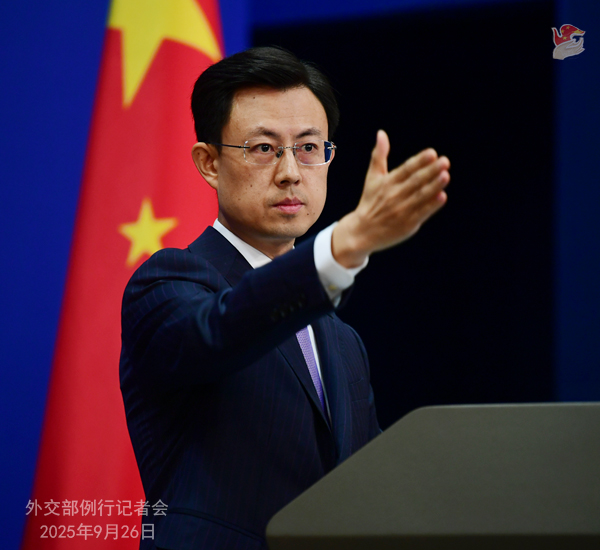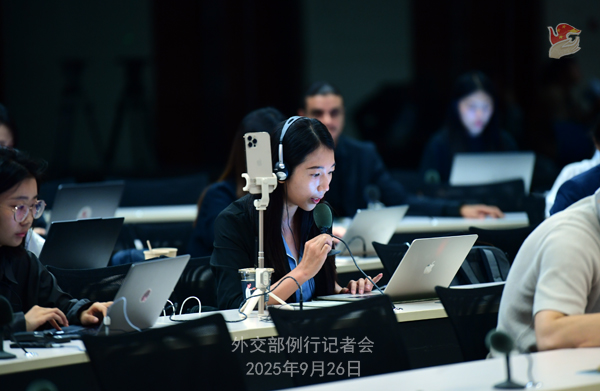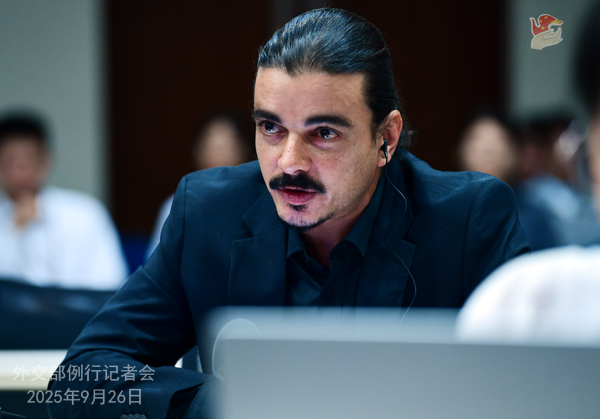
People’s Republic of China


CCTV: We noted that UN Secretary-General António Guterres said on the sidelines of the UNGA that the United Nations are under assault as never before. Poverty and hunger are the two top issues on the UN 2030 Agenda for Sustainable Development. To end them is the shared goal of the international community. He called on all parties to renew the foundations of international cooperation, deliver for people everywhere, and rise to this moment with solidarity and courage. At the general debate, Brazilian President Luiz Inacio Lula da Silva and other leaders also called for cooperation against hunger and poverty. What’s China’s comment?
Guo Jiakun: To eradicate poverty and hunger is high on the UN 2030 Agenda for Sustainable Development and is the shared goal of the international community.
As a responsible major developing country, China cares about both the speed and the actual results when it comes to poverty alleviation. China has lifted 800 million people out of poverty and realized the poverty reduction goal of the UN 2030 Agenda for Sustainable Development 10 years ahead of schedule, accounting for over 70 percent of the world’s total. China is committed to reducing poverty both on a human level and a global level. Keeping in mind the pressing difficulties and problems that concern people’s livelihood in developing countries, China has helped many countries explore a path of poverty relief and sustainable development tailored to their national conditions. We have put forward and acted on the Global Development Initiative, continued to upgrade the Global Development and South-South Cooperation Fund, and supported over 20 international organizations, including the United Nations Development Programme, in carrying out over 180 programs in more than 60 countries, which have benefited over 30 million people. That is a strong boost to global poverty relief.
The rights to subsistence and development are the human rights of primary importance. China’s eradication of absolute poverty is the largest human rights program and the most effective human rights practice. China will continue to serve the global good with a strong sense of responsibility, take solid actions to advance the global development cause, and work with other parties to make poverty and hunger a thing of the past and translate the vision of common development into a reality.
Reuters: U.S. President Donald Trump has signed an executive order enabling TikTok’s continued operations in the U.S. Vice President JD Vance said the company had been valued at US$14 billion. Is the Foreign Ministry able to confirm that and give us any more information on the deal?
Guo Jiakun: Following the China-U.S. talks on economic and trade issues in Madrid, competent authorities have shared information on the basic framework consensus on the TikTok issue, which you may refer to. Let me reiterate that China’s position on the TikTok issue is clear: The Chinese government respects the wishes of the company in question, and would be happy to see productive commercial negotiations in keeping with market rules lead to a solution that complies with China’s laws and regulations and takes into account the interests of both sides. The U.S. side needs to provide an open, fair and non-discriminatory environment for Chinese investors.
Telesur: The United States deployed warships and troops in the Caribbean Sea under the pretext of combating drug trafficking, raising concerns about regional peace and threatening Venezuela's sovereignty. Now Venezuelan fishing vessels are being attacked. What is the Chinese government’s stance on this subject?
Guo Jiakun: China opposes the threat or use of force in international relations, opposes moves that undermine peace and stability in Latin America and the Caribbean, and opposes external interference in Venezuela’s domestic affairs under any pretext.
The U.S. unilateral and excessive enforcement operations against other countries’ vessels in so-called “international waters” violate international law and relevant personnel’s right to life and other basic human rights. They pose a threat to the freedom and security of navigation in relevant waters, and can potentially undermine other countries’ freedom of the high seas enjoyed in accordance with the law. China supports the effort of combating cross-border crimes through stronger international cooperation, and calls on the U.S. to engage in normal law enforcement and judicial cooperation through bilateral and multilateral legal frameworks.
Global Times: On the sidelines of the 80th session of the UN General Assembly and high-level events this week, foreign ministers of China, Russia, Pakistan and Iran held an informal meeting on Afghanistan and released a joint statement. It’s mentioned in the statement that the four sides emphasized that the sovereignty, independence and territorial integrity of Afghanistan should be respected, and firmly opposed the reestablishment of military bases in and around Afghanistan by the countries responsible for the current situation, which is not conducive to regional peace and stability. Some media reports say that it’s a response to Trump’s remarks of regaining Bagram Air Base. What’s China’s comment?
Guo Jiakun: On September 25, foreign ministers of China, Russia, Pakistan and Iran held an informal meeting on Afghanistan on the sidelines of the 80th session of the UN General Assembly in New York. Ambassador Yue Xiaoyong, Special Envoy for Afghan Affairs of China’s Ministry of Foreign Affairs, attended the meeting in person. The meeting issued a joint statement, emphasizing that the sovereignty, independence and territorial integrity of Afghanistan should be respected, and reiterating firm opposition to the reestablishment of military bases in and around Afghanistan by the countries responsible for the current situation. The statement fully shows that Afghanistan’s neighboring countries respect the country’s sovereignty, independence and national dignity and that the international community share a common will of rendering Afghanistan assistance and keeping the country stable. As a close neighbor of Afghanistan and a responsible country, China stands ready to continue working with the international community to provide assistance to Afghanistan and play a constructive role for the country’s peace and reconstruction.
Kyodo News: It’s reported that former Japanese Prime Minister and Liberal Democratic Party’s supreme adviser Taro Aso met on September 25 with Taiwan’s “Legislative Speaker.” He said that “Taiwan is a country that shares fundamental values with Japan.” What’s China’s comment?
Guo Jiakun: This is not the first time that certain Japanese politician has made provocations on the Taiwan question. The behavior constitutes serious violation of the one-China principle and the guiding principles of the four political documents between China and Japan and gross interference in China’s internal affairs. We strongly deplore and oppose it and have protested to Japan through diplomatic channels. There is but one China in the world, and Taiwan is an inalienable part of China’s territory. This is the real status quo across the Taiwan Strait. The Cairo Declaration and the Potsdam Proclamation explicitly stated that all the territories Japan had stolen from the Chinese, such as Taiwan and the Penghu Islands, shall be restored to China. That is an important component of the post-war international order.
Taiwan is a province of China and has never been a country. The Taiwan question bears on China’s core interests and the political foundation of China-Japan ties and basic trust between the two countries. This year marks the 80th anniversary of the victory of the Chinese People’s War of Resistance Against Japanese Aggression. It is also the 80th anniversary of the restoration of Taiwan. Japan bears historical responsibilities to the Chinese people on the Taiwan question and should act all the more prudently. We urge Japan to abide by the principles and spirit of the four political documents between China and Japan, properly handle Taiwan-related issues, act on its commitment of “fully understanding and respecting” the fact that “Taiwan is an inalienable part of the territory of the People's Republic of China,” and stop official interactions with Taiwan under whatever pretext. Japan must not make any provocation or take any dangerous move on the Taiwan question, and should not underestimate the firm resolve, will and ability of the Chinese people to defend national sovereignty and territorial integrity.

Polish Press Agency: Polish Foreign Minister Radosław Sikorski said in a recent interview with Foreign Affairs magazine that “China is the only country that could force the end” of Russia’s war against Ukraine. However, China “is not willing to do that,” because “the war suits China just fine” in terms of, as he puts it, “making money from selling dual-use and other stuff to Russia.” We know that China’s position on the so-called Ukrainian crisis has been consistent and clear, so I’d like to ask what is China’s comment on Sikorski’s words and whether the Chinese side is going to put any pressure on Russia to stop the invasion, if China really wants to see the end of this war.
Guo Jiakun: China is neither the one that created the Ukraine crisis nor a party to it. Nevertheless, as a permanent member of the UN Security Council and a responsible major country, we have held an objective and just position, and worked actively to promote talks for peace. Our effort has been widely recognized by the international community and we believe Poland is also fully aware of it.
It is not China, but someone else who do not want the conflict to end and has been stoking the flames and profiteering from it. Scapegoating China does not solve any issue. The root cause of the Ukraine crisis lies in regional security tensions that have built up over the years in Europe. Only by accommodating the legitimate security concerns of all parties and creating a balanced, effective, and sustainable European security architecture through dialogue and negotiation, can the issue be properly addressed. We support Europe in playing a greater positive role in the political settlement of the Ukraine crisis.
RIA Novosti: Palestine has applied for full membership in BRICS, but has not yet received a response, Palestinian Ambassador to Russia told RIA Novosti. What’s the Ministry’s comment? Does China support Palestine in joining the BRICS?
Guo Jiakun: BRICS is an important platform for cooperation among emerging markets and developing countries and source of strong impetus for multipolarity and greater democracy in international relations. The platform is widely recognized by Global South countries. We welcome more like-minded partners to join BRICS cooperation and jointly work for a more just and equitable international order.
AFP: The United Nations Security Council will vote today on a resolution to delay the reimposition of UN sanctions on Iran. This resolution has been put forward by China and Russia, but frankly, this is unlikely to pass. That means that UN sanctions on Iran actually will be reimposed from tomorrow. What is China’s comment?
Guo Jiakun: China is committed to the settlement of the Iranian nuclear issue through political and diplomatic means and is opposed to the threat of force, sanctions and pressuring. To trigger the UN Security Council “snapback” mechanism is not a constructive move and will not help rebuild trust and bridge differences. The pressing priority now is to step up diplomatic effort and avoid escalation. China will continue to promote talks for peace and play a constructive role for a solution that accommodates the legitimate concerns of all parties.
China News Service: On September 23, Thailand’s new Prime Minister Anutin Charnvirakul attended the reception held by China’s Embassy to Thailand celebrating the 76th anniversary of the founding of the People’s Republic of China. The Prime Minister in his speech spoke highly of China’s outstanding development achievements and the important role that China has played for world peace, stability and prosperity. He stressed that Thailand and China are as close as one family and he welcomed Chinese companies to invest in Thailand and Chinese tourists to visit his country. What’s China’s comment?
Guo Jiakun: Earlier this week, Thai Prime Minister Anutin Charnvirakul attended and addressed the reception held by China’s Embassy in Bangkok to celebrate the 76th anniversary of the founding of the People’s Republic of China. It shows the high importance that the new government of Thailand attaches to relations with China. His speech drew warm response.
This year marks the 50th anniversary of China-Thailand diplomatic relations and “the Golden Jubilee of China-Thailand Friendship.” Under the strategic guidance of leaders of the two countries, the China-Thailand comprehensive strategic cooperative partnership has further deepened, and the family-like relationship as well as a China-Thailand community with a shared future are more deeply rooted in the hearts of our two peoples.
Financial Times: Can China provide any more information on China’s view and understanding of the TikTok deal and the structure of the deal?
Guo Jiakun: I have just answered this question.
Telesur: The Climate Summit was convened at the UN to prepare for COP 30 in Brazil in November. Xi Jinping participated via video and announced that China has made major commitments to fighting global warming and curbing greenhouse gas emissions. What are the government’s expectations for this climate conference in Brazil?
Guo Jiakun: In his video remarks to the United Nations Climate Summit, President Xi Jinping announced China’s new NDCs, which shows China’s support to the UN, commitment to multilateralism and determination to advance climate actions. It provides strong political impetus for the United Nations Climate Change Conference in Belém (COP 30).
Global climate governance is facing increasing uncertainties at the moment. As President Xi Jinping noted, the international community should stay focused on the right direction, remain unwavering in confidence, unremitting in actions and unrelenting in intensity, with a view to providing more positive energy to the cooperation on global climate governance.
China hopes that COP 30 in November will boost confidence in global climate governance, enhance international cooperation on climate change, and galvanize stronger action. To promote the full and effective implementation of the Paris Agreement, we stand ready to work with other parties to practice true multilateralism, uphold the principle of common but differentiated responsibilities, and make the conference a success.




